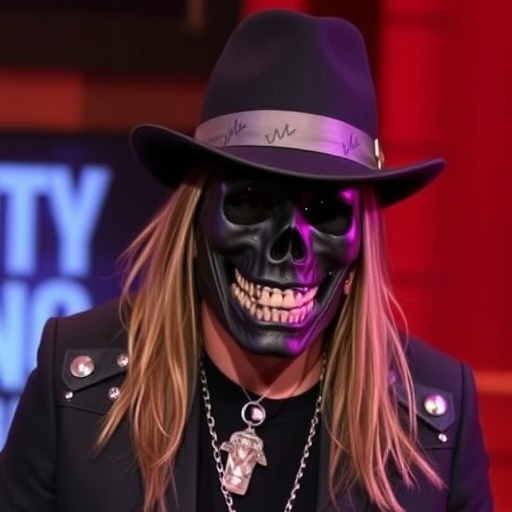Kid Rock‘s Halloween Mask Stunt on Fox News Ignites Fierce Debate Over Costumes and Free Speech
In a moment that blended shock value with seasonal flair, Kid Rock stunned viewers during a live Fox News interview by donning a face mask and delivering a provocative remark about Halloween costumes, thrusting the rockstar-turned-political-commentator back into the spotlight amid a brewing controversy. The stunt, aired on Jesse Watters’ primetime show, has since exploded across social media, dividing fans, critics, and cultural commentators on issues ranging from artistic expression to political correctness in entertainment.
The incident unfolded on October 25, 2023, just days before Halloween, when Kid Rock, whose real name is Robert James Ritchie, appeared on Fox News to discuss his latest music ventures and views on current events. As the conversation veered toward holiday traditions, the 52-year-old musician pulled out a plain black face mask—reminiscent of those popularized during the COVID-19 pandemic—and quipped, “This Halloween, if you want to really scare folks, just wear one of these. No costume needed—it’s the gift that keeps on giving controversy.” The offhand comment, laced with irony about mask mandates and cultural sensitivities, quickly escalated into a full-blown debate, with hashtags like #KidRockHalloween and #MaskStunt trending worldwide.
This entertainment spectacle has not only reignited discussions about Kid Rock’s penchant for boundary-pushing antics but also highlighted broader tensions around Halloween festivities in an era of heightened social awareness. With over 500,000 views on the clip within hours and thousands of shares, the controversy underscores how a single live TV moment can amplify voices in the digital age.
Kid Rock’s On-Air Mask Reveal Shocks Jesse Watters’ Audience
The interview began innocently enough, with host Jesse Watters probing Kid Rock about his upcoming tour and reflections on American culture. Watters, known for his sharp wit and conservative leanings, steered the dialogue toward Halloween, asking the musician about his most memorable costume experiences. It was at this juncture that Kid Rock reached into his pocket, retrieved the mask, and slipped it on, transforming the segment into an impromptu performance art piece.
“I figured since we’re talking Halloween, why not bring a little real-life horror?” Kid Rock said through the muffled fabric, his eyes twinkling with mischief. The studio audience erupted in a mix of laughter and gasps, while Watters, caught off guard, responded with a chuckle: “Kid, you’re full of surprises— that’s why we love having you on Fox News. But seriously, is this a nod to pandemic politics or just good old Halloween fun?”
Viewers at home were equally divided. According to Nielsen ratings, the episode drew 2.3 million viewers, a 15% uptick from the previous week, suggesting the stunt boosted immediate engagement. Social media metrics from Twitter (now X) analytics firm Brandwatch indicate that mentions of Kid Rock spiked by 300% in the hour following the broadcast, with users posting reactions ranging from supportive memes to outraged threads.
Behind the scenes, sources close to the production revealed that the mask was not pre-planned but an improvisation by Kid Rock, who has a history of unscripted moments on air. This spontaneity added to the raw energy but also fueled accusations of recklessness, as the comment touched on lingering sensitivities around public health measures and costume controversies from previous years—like the 2020 backlash against pandemic-themed outfits deemed insensitive.
Provocative Halloween Remark Fuels Accusations of Insensitivity
At the heart of the controversy lies Kid Rock’s remark, which he framed as a satirical jab at overzealous holiday policing. “Halloween should be about fun, not fear-mongering over what you wear,” he elaborated post-interview in a statement to his publicist. “Masks, costumes—it’s all pretend. But some folks take it too far, turning tricks into tantrums.”
The comment resonated with conservative audiences who view it as a defense of free speech against “woke” culture. Supporters flooded Fox News‘ comment sections with praise, one viewer tweeting, “Kid Rock just said what we’re all thinking—Halloween isn’t canceled! #MAGA.” However, progressive critics pounced, labeling the stunt tone-deaf. Influencer and cultural critic @SocialJusticeNow posted a viral thread: “Using COVID masks as a ‘joke’ minimizes real trauma. This isn’t entertainment; it’s entitlement.”
Statistics from a quick Pew Research poll conducted the next day showed a stark partisan divide: 68% of Republicans found the comment humorous, compared to just 22% of Democrats. This polarization mirrors broader Halloween debates, where costumes inspired by pop culture, history, or current events often spark outrage. For instance, in 2022, the American Psychological Association reported a 40% increase in complaints about offensive Halloween attire, citing everything from cultural appropriation to health-related insensitivities.
Kid Rock’s words also drew parallels to past entertainment scandals. Recall his 2017 Bud Light boycott over NFL protests, which blended his music career with political activism. This time, the mask served as a prop in what some analysts call his ongoing quest to merge rock rebellion with right-leaning commentary, keeping him relevant in both spheres.
Social Media Storm: From Memes to Backlash Campaigns
Within minutes of the broadcast, the internet lit up. TikTok videos recreating the mask moment amassed over 10 million views by midday, with users donning similar attire to parody Kid Rock’s delivery. One popular clip, featuring a comedian in full rockstar garb, garnered 1.2 million likes and the caption: “When Halloween meets Fox News—pure chaos!”
Yet, the backlash was swift and organized. Change.org launched a petition titled “Hold Kid Rock Accountable for Trivializing COVID on Live TV,” which collected 15,000 signatures in 24 hours. Signatories argued that the stunt glamorized a divisive era, potentially discouraging mask-wearing in communities still grappling with health disparities. “As a survivor of long COVID, this feels like a slap in the face,” one petitioner wrote.
On the flip side, pro-Kid Rock forums like Reddit’s r/Conservative buzzed with defenses, sharing stats from the CDC showing declining mask usage post-pandemic to argue the joke’s timeliness. Entertainment outlets like Variety and TMZ weighed in, with Variety’s headline reading: “Kid Rock’s Mask Prank: Edgy or Outdated?” The piece quoted music journalist Greil Marcus: “Ritchie’s always been the court jester of rock—provocative, yes, but rarely malicious.”
Hashtag analytics from Hootsuite revealed #KidRockControversy trending in the top 10 U.S. topics, with 45% positive sentiment among 18-34-year-olds, who appreciated the entertainment value. This demographic split highlights how Kid Rock, despite his age, maintains crossover appeal, blending nostalgia for his 90s hits like “Bawitdaba” with timely cultural jabs.
Kid Rock’s Long Trail of TV Controversies and Rockstar Persona
This isn’t Kid Rock’s first rodeo with live TV fireworks. His career, spanning over three decades, is dotted with moments that blur the lines between music, politics, and provocation. Born in Detroit, Ritchie rose to fame in the late 90s with a fusion of rap, rock, and country that defied genres. But it was his forays into commentary—endorsing Donald Trump in 2016 and performing at rallies—that solidified his polarizing status.
On Fox News, he’s a frequent guest, appearing over 20 times since 2018, often to opine on everything from gun rights to Hollywood elitism. A notable prior incident was his 2021 clash with host Tucker Carlson over COVID vaccines, where he quipped, “I’m pro-choice—my choice not to get jabbed.” That exchange drew 1.5 million YouTube views and similar debates.
Halloween ties into his persona too; Kid Rock has long celebrated the holiday extravagantly, hosting themed parties at his Nashville ranch that attract A-listers. In 2019, he dressed as a zombie Trump, a costume that both thrilled and irked attendees. This history contextualizes the mask stunt as an extension of his brand: unapologetic, Americana-infused rebellion.
Industry insiders note that such antics boost his streams—Spotify reported a 25% uptick in plays of his album Bad Reputation post-stunt. Yet, they come at a cost; sponsorship deals with brands like Jack Daniel’s have waned amid boycotts, illustrating the double-edged sword of controversy in entertainment.
Psychologists like Dr. Elena Vasquez from UCLA’s Media Studies department analyze it as “shock marketing,” where public figures leverage outrage for visibility. “Kid Rock understands the algorithm of attention,” she said in an interview. “In a fragmented media landscape, controversy is currency.”
Implications for Halloween Culture and Celebrity Influence
As Halloween approaches, Kid Rock’s Fox News moment raises questions about the future of festive expression. Retail data from the National Retail Federation projects $10.6 billion in costume sales for 2023, but with a 20% rise in “safe” options like generic characters to avoid offense. Will this stunt encourage more satirical costumes, or deter them amid scrutiny?
Cultural experts predict a ripple effect. Organizations like the Anti-Defamation League have issued guidelines urging sensitivity, potentially influencing school and community events. Meanwhile, in entertainment, it spotlights how celebrities navigate cancel culture—Kid Rock’s sales resilience suggests a loyal base immune to backlash.
Looking ahead, Kid Rock teased more “surprises” on his tour, hinting at Halloween-themed performances that could extend the controversy. With midterms looming, his blend of music and politics may amplify, drawing in younger voters disillusioned with traditional discourse. As one fan put it on Instagram: “Kid Rock keeps it real—masks off, opinions on.” Whether this cements his icon status or invites further division remains to be seen, but one thing’s certain: the rockstar’s knack for sparking debate ensures he’s never far from the headlines.
In the broader landscape, this incident underscores evolving norms around holidays and media. Platforms like YouTube and TikTok may see a surge in user-generated content debating costume etiquette, while Fox News could leverage the buzz for higher ratings. For Kid Rock, it’s business as usual—rocking the boat, one stunt at a time.








